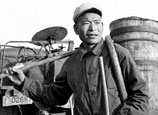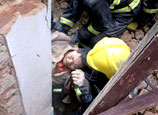
 |
| Wuyuan draws a big crowd of art students. (China Daily/Zhang Zixuan) |
Most homes located on the riverbanks double as shops and hostels. They sell camphor tree products, rice wine and local snacks. The sounds of vendors calling out their wares and tourists bargaining with them create a lively rhythm.
One upside of Wuyuan's commercialization is the quality of its tourist services. Among all the county's villages, Small Likeng probably has the widest selection of restaurants, bars and hostels to suit customers of every budget. Big Likeng, on the other hand, is much quieter and relatively untouched.
Situated on a hill 56 km from the county seat, Big Likeng is quite hard to reach. Visitors need to take a car or motorbike taxi to traverse the winding mountain road, which is sometimes blocked by soil that rain has eroded.
For tourists seeking a challenge, a bicycle ride to the village may be just what they need.
Since homes in Big Likeng are made of wood, many of them did not survive the fires that have broken out throughout the centuries. But their ruins, navigable through moss-covered flagstone paths, remain intact.
The village has become a favorite destination of art students and photographers, who sometimes stay for months documenting the majestic old architecture.


















 Matchmaking websites crack down on user fraud
Matchmaking websites crack down on user fraud


![]()
